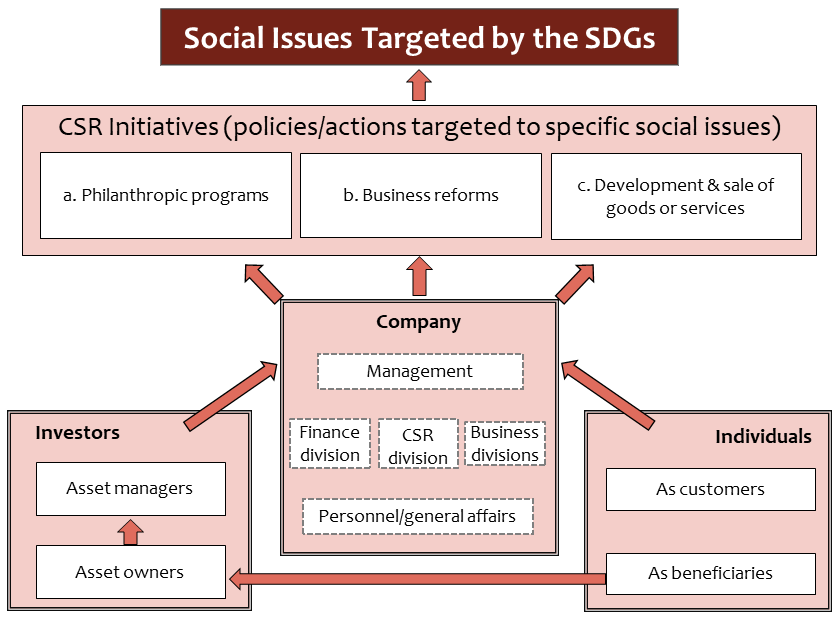- Policy Proposal
- Industry, Business, Technology
Reaffirming the Value of CSR: Executive Summary, CSR White Paper 2018
December 4, 2018

In 2017, the Tokyo Foundation for Policy Research conducted its fifth annual CSR survey. Built around the theme of “Reaffirming the Value of CSR,” this latest survey sought to shed light on the relationship between issue-oriented CSR (initiatives or policies targeting specific social issues) and the main activities of each business. Our 2018 CSR White Paper presents the results of this survey, together with expert opinions and recommendations for issue-oriented CSR and for spreading recognition of the value of such corporate initiatives internally and externally.
About the Project
Since 2013, the CSR research project of the Tokyo Foundation for Policy Research has conducted an annual questionnaire survey on corporate social responsibility in Japan. Thanks to the cooperation of the Japanese business community, these surveys have yielded a wealth of meaningful data, which we publish in our CSR White Paper, along with case studies and essays by distinguished experts.
In our previous CSR White Paper (2017), we emphasized the growing pressure Japanese businesses are under to contribute to the mitigation of society’s increasingly complex and multifarious problems. This trend has accelerated over the past year. Globally, governments and institutional investors have called for concrete steps to transition to a zero-carbon-emissions economy. Domestically, Japanese companies are under intense pressure to raise labor productivity and improve working conditions.
The scope of social issues demanding a response from business continues to grow. As a result, approaches to CSR are diversifying, even as companies converge toward the basic goal of integrating social action into their business operations—something we at the Foundation have long stressed. At the same time, prevailing attitudes toward corporate social action and its relevance seem to vary widely by stakeholder group and even by department and position. We have had occasion to wonder whether this lack of consensus might not be impeding progress toward the resolution of social issues.
Our most recent survey, conducted in fiscal 2017, was designed with such questions in mind. While continuing to gather trend data on such core themes as stakeholder dialogue and collaboration, we added new questions aimed at gaining insight into the relationship between corporate social action and business activity.
We asked each responding company to categorize its high-priority CSR initiatives (defined as corporate efforts to address specific social issues, including actual or potential problems stemming from their own business processes) by type, choosing one of the following three categories.
1. Philanthropic programs (financial or in-kind donations, pro-bono services, employee participation in volunteer activities)
2. Socially responsible business reforms (reform of such processes as procurement, manufacturing, and distribution or of such internal functions as employment and personnel management)
3. Development or sale of socially responsible products or services

After tabulating and analyzing the results, we asked experts from industry, academia, and the social sector to offer their own perspective on productive CSR approaches and ways to promote broader recognition of the importance and relevance of such efforts among internal and external stakeholders. Drawing on these insights, we have compiled a set of recommendations, summarized below.
Survey Analysis and Recommendations
1. CSR Priorities
Analysis of survey results
Responding companies showed a strong bias toward domestic issues when identifying social problems of concern to them, and this gap was even more conspicuous at the action stage of the CSR process. Survey results also suggest that Japanese companies are more apt to be interested and involved in issues that they can easily address via existing business operations and processes. This suggests that they have embraced the concept of integrating social action into core business operations.
With regard to domestic issues, Japanese companies tend to prioritize economic growth, employment, climate change and natural disasters, and health and well-being. They place relatively low emphasis on poverty, hunger, and peace, even though opinion polls indicate that these are issues of great concern to the general public.
Expert insights
● Dialogue between industry and a broad range of stakeholders—particularly the social sector—is more vital than ever to close the perception gap between industry and the public at large regarding the urgency of poverty, hunger, and peace as domestic issues.
● Companies must go beyond identifying the Sustainable Development Goals relevant to their existing operations and begin restructuring their businesses around social issues targeted by the SDGs. The times demand not “renovation” (superficial modifications of current business strategies) but “innovation” (development of new business strategies and product segments).
● At the most fundamental level, a business is an entity that is paid to offer solutions to society’s challenges. One key to sustainable management henceforth will be the reaffirmation of that fundamental raison d’être.
● Dialogue and collaboration with a wider range of stakeholders—particularly the social sector and society’s vulnerable—can help instill in managers and employees the capacity to form sound value judgments independently, contributing to effective corporate decision making.
Conclusions
● Businesses need to return to their original purpose of offering solutions to society’s challenges and take an interest in a wider range of issues (not just those directly relevant to their core business), even in fields where progress may be difficult to quantify. (Stakeholder dialogue is an essential tool for broadening the scope of a company’s interest and involvement in social issues.)
● Instead of taking their existing operations and organization as a given (inside-out approach), companies should work backwards from issue-oriented sustainability goals and rethink their products, processes, and structure (outside-in approach), collaborating with various stakeholder groups to supplement their financial and human resources as appropriate.
2. Types of CSR Initiatives
Analysis of survey results
The types of CSR initiatives favored by Japanese companies vary according to the social issue targeted. Generally speaking, however, companies (or at least their CSR departments) are placing less emphasis on corporate philanthropy (in the form of donations or volunteer activities) and more emphasis on CSR as an integral aspect of business operations: socially responsible business processes and policies on the one hand and the development and sale of socially responsible products and services on the other. Asked how the company itself benefits from these initiatives, a relatively large percentage of respondents cited improvements in corporate or brand image and impact on the organization and human resources (via training, hiring practices, and general consciousness raising). Few saw a positive effect on corporate profits.
Expert insights
● The integration of social and economic value can be part of an active business strategy oriented to competitive advantage, but the success of such a strategy hinges on the company’s ability to recover the costs of integration and create a structurally sustainable business model.
● Japanese industry needs to raise its awareness of human rights as the common underlying thread running through all the SDGs. All businesses should adopt a basic policy on human rights, institute systems to prevent violations, and ensure that their policies and systems are rigorously implemented.
● Corporate philanthropy, including volunteer programs, can help lay the foundations for strong business management by training and motivating personnel and building networks and relationships of trust with the broader community. However, there is a need to clarify the strategic significance of such programs in terms of how they contribute to specific management goals and how the company is building on those foundations.
Conclusions
● The development and sale of products and services to address social problems are bound to assume a more important role in business strategy going forward, but to confer a competitive advantage, such initiatives must be built around sustainable, profitable business models, not just high-minded principles.
● When it comes to reform of business processes, employment, and personnel management, companies must cultivate a stronger awareness of human-rights principles, which are germane to all social issues, and implement robust systems to prevent abuses.
● Making corporate philanthropy—commonly regarded as the “old school” of CSR—relevant to the business requires a strategic approach and a clear explanation.
3. Conveying the Significance of CSR Initiatives
Analysis of survey results
Generally speaking, respondents gave fairly positive assessments of their companies’ CSR programs. Almost 80% indicated that the company’s top executives had shown leadership in responding to social issues, and 72% felt that the program had contributed to the mitigation of social problems. Fewer were satisfied with their companies’ CSR training and education, allocation of funds and personnel, and CSR evaluations. Respondents’ relatively low assessment of budgetary and personnel allocation and internal assessment, notwithstanding their positive assessment of leadership at the top, suggests that enthusiasm for CSR may not be trickling down to the working level.
Expert insights
● Integration of sustainability into business management is only achievable when top executives lead the way with a clear vision and set of priorities. The business sector should also work on enhancing leadership and policymaking at the industry level.
● The integration of economic and social value involves a radically new way of doing business based on a major shift in values. Top executives must strive continuously to impart those values to company employees—particularly middle managers, who play such a crucial role in changing corporate culture and business practices.
● It is up to business to develop ways of making their social contribution visible and to establish social responsibility as a competitive criterion, alongside cost and quality. Global leaders in CSR define the social value they wish to create in concrete terms, assess their outcomes and impacts quantitatively, and effectively communicate that information to the public.
Conclusions
In addition to recognizing the importance of top-down leadership for effective implementation of CSR programs, executives must continue to explain to internal and external stakeholders the substance and significance of their efforts to integrate social responsibility into business operations. With regard to program evaluation, companies need to adopt objective indicators of social responsibility and work to establish CSR as a differentiating factor.
Next Steps
Going forward, the Foundation’s CSR research project team plans to look more closely at companies’ efforts to promote awareness of the content and significance of their increasingly diverse CSR initiatives, with an emphasis on external stakeholders.
As contributors to this year’s CSR White Paper have pointed out, growing interest in ESG investing (taking into account environmental, social, and governance criteria), together with the outstanding work of certain CSR front-runners, has raised expectations across the board with regard to social responsibility and sustainability reporting. Moreover, with shareholders wielding greater influence over management than ever before, more and more Japanese companies are recognizing the need to provide clear, concrete information detailing and explaining their CSR programs.
With these considerations in mind, we plan to undertake a multifaceted examination of the changing stakeholder environment, prevailing and recommended approaches to sustainability reporting, and the responsibilities and challenges facing external stakeholders when it comes to interpreting and acting on such information.
